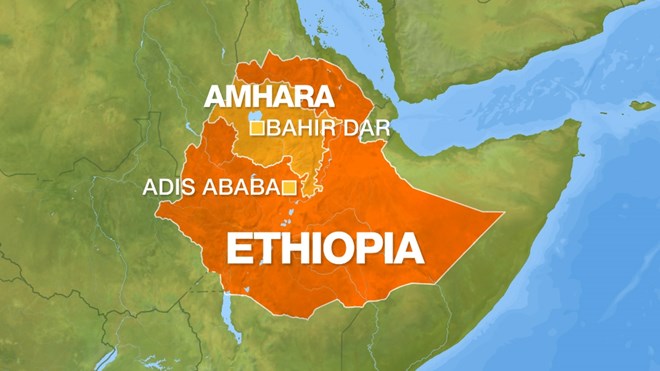Ethiopia’s Amhara state chief killed amid regional coup attempt
The head of Ethiopia's Amhara state and his adviser were killed during a coup attempt in their state, state media reported on Sunday.
The head of Ethiopia’s Amhara state and his adviser were killed during a coup attempt in their state, state media reported on Sunday.
Ambachew Mekonnen and his adviser Ezez Wasie were attacked in their offices on Saturday, state media reported, without saying who was responsible.
Earlier, the Ethiopian prime minister announced that the country’s army chief of staff had also been shot while thwarting the attempted coup in Amhara, a federal state north of the capital Addis Ababa.
Later the spokeswoman for the prime minister confirmed the country’s army chief Seare Mekonnen was shot dead by his bodyguard just hours after the coup attempt.
Billene Seyoum told journalists a “hit squad” led by Amhara’s security chief Asaminew Tsige burst into a meeting on Saturday afternoon, injuring regional president Ambachew Mekonnen and another top official who both died of their wounds.
Residents in Amhara’s capital Bahir Dar said late on Saturday there was gunfire in some neighbourhoods and some roads had been closed off.
The US embassy issued alerts about reported gunfire in the capital, Addis Ababa, and violence around Bahir Dar.
Early on Sunday, Brigadier General Tefera Mamo, the head of special forces in Amhara, told state television that “most of the people who attempted the coup have been arrested, although there are a few still at large.”
Since coming to power last year, Abiy has tried to spearhead political reforms to open up the once isolated, security-obsessed country of 100 million people on the Horn of Africa.
He has released political prisoners, lifted bans on political parties and prosecuted officials accused of gross human rights abuses, but his government is battling mounting violence.
Ethnic bloodshed – long held in check by the state’s iron grip – has flared up in many areas, including Amhara, where the regional government was led by Ambachew Mekonnen.

“Since Abiy Ahmed took power and the country moved towards democratisation … there have been different forms of mobilisations, by different actors, particularly nationalists.” Awol Allo, a lecturer in law at Keele University, told Al Jazeera.
“[In] Amhara regional state, there is this feeling that they were marginalised, and these individuals that were suspected to be behind the coup recently said that Amhara people have never been subordinated.. so there is this sense of grievance and victimhood that is driving the nationalist movements,” he added.
Ethiopia is due to hold a national parliamentary election next year. Several opposition groups have called for the polls to be held on time despite the unrest and displacement.





